- Home
- Alice Munro
Alice Munro's Best Page 3
Alice Munro's Best Read online
Page 3
“You know I used to live out here?” Becky said, noticing Rose. “Hey! What’s-your-name! Didn’t I used to live out here, Flo?”
“If you did it was before my time,” said Flo, as if she didn’t know anything.
“That was before the neighborhood got so downhill. Excuse me saying so. My father built his house out here and he built his slaughterhouse and we had half an acre of orchard.”
“Is that so?” said Flo, using her humoring voice, full of false geniality, humility even. “Then why did you ever move away?”
“I told you, it got to be such a downhill neighborhood,” said Becky. She would put a whole cookie in her mouth if she felt like it, let her cheeks puff out like a frog’s. She never told any more.
Flo knew anyway, and who didn’t. Everyone knew the house, red brick with the veranda pulled off and the orchard, what was left of it, full of the usual outflow – car seats and washing machines and bed-springs and junk. The house would never look sinister, in spite of what had happened in it, because there was so much wreckage and confusion all around.
Becky’s old father was a different kind of butcher from her brother, according to Flo. A bad-tempered Englishman. And different from Becky in the matter of mouthiness. His was never open. A skinflint, a family tyrant. After Becky had polio he wouldn’t let her go back to school. She was seldom seen outside the house, never outside the yard. He didn’t want people gloating. That was what Becky said, at the trial. Her mother was dead by that time and her sisters married. Just Becky and Robert at home. People would stop Robert on the road and ask him, “How about your sister, Robert? Is she altogether better now?”
“Yes.”
“Does she do the housework? Does she get your supper?”
“Yes.”
“And is your father good to her, Robert?”
The story being that the father beat them, had beaten all his children and beaten his wife as well, beat Becky more now because of her deformity, which some people believed he had caused (they did not understand about polio). The stories persisted and got added to. The reason that Becky was kept out of sight was now supposed to be her pregnancy, and the father of the child was supposed to be her own father. Then people said it had been born, and disposed of.
“What?”
“Disposed of,” Flo said. “They used to say go and get your lamb chops at Tyde’s, get them nice and tender! It was all lies in all probability,” she said regretfully.
Rose could be drawn back – from watching the wind shiver along the old torn awning, catch in the tear – by this tone of regret, caution, in Flo’s voice. Flo telling a story – and this was not the only one, or even the most lurid one, she knew – would incline her head and let her face go soft and thoughtful, tantalizing, warning.
“I shouldn’t even be telling you this stuff.”
More was to follow.
Three useless young men, who hung around the livery stable, got together – or were got together, by more influential and respectable men in town – and prepared to give old man Tyde a horsewhipping, in the interests of public morality. They blacked their faces. They were provided with whips and a quart of whisky apiece, for courage. They were: Jelly Smith, a horse-racer and a drinker; Bob Temple, a ballplayer and strongman; and Hat Nettleton, who worked on the town dray, and had his nickname from a bowler hat he wore, out of vanity as much as for the comic effect. He still worked on the dray, in fact; he had kept the name if not the hat, and could often be seen in public – almost as often as Becky Tyde – delivering sacks of coal, which blackened his face and arms. That should have brought to mind his story, but didn’t. Present time and past, the shady melodramatic past of Flo’s stories, were quite separate, at least for Rose. Present people could not be fitted into the past. Becky herself, town oddity and public pet, harmless and malicious, could never match the butcher’s prisoner, the cripple daughter, a white streak at the window: mute, beaten, impregnated. As with the house, only a formal connection could be made.
The young men primed to do the horsewhipping showed up late, out side Tyde’s house, after everybody had gone to bed. They had a gun, but they used up their ammunition firing it off in the yard. They yelled for the butcher and beat on the door; finally they broke it down. Tyde concluded they were after his money, so he put some bills in a handkerchief and sent Becky down with them, maybe thinking those men would be touched or scared by the sight of a little wry-necked girl, a dwarf. But that didn’t content them. They came upstairs and dragged the butcher out from under his bed, in his nightgown. They dragged him outside and stood him in the snow. The temperature was four below zero, a fact noted later in court. They meant to hold a mock trial but they could not remember how it was done. So they began to beat him and kept beating him until he fell. They yelled at him, Butcher’s meat! and continued beating him while his nightgown and the snow he was lying in turned red. His son Robert said in court that he had not watched the beating. Becky said that Robert had watched at first but had run away and hid. She herself had watched all the way through. She watched the men leave at last and her father make his delayed bloody progress through the snow and up the steps of the veranda. She did not go out to help him, or open the door until he got to it. Why not? she was asked in court, and she said she did not go out because she just had her nightgown on, and she did not open the door because she did not want to let the cold into the house.
Old man Tyde then appeared to have recovered his strength. He sent Robert to harness the horse, and made Becky heat water so that he could wash. He dressed and took all the money and with no explanation to his children got into the cutter and drove to Belgrave where he left the horse tied in the cold and took the early-morning train to Toronto. On the train he behaved oddly, groaning and cursing as if he was drunk. He was picked up on the streets of Toronto a day later, out of his mind with fever, and was taken to a hospital, where he died. He still had all the money. The cause of death was given as pneumonia.
But the authorities got wind, Flo said. The case came to trial. The three men who did it all received long prison sentences. A farce, said Flo. Within a year they were all free, had all been pardoned, had jobs waiting for them. And why was that? It was because too many higher-ups were in on it. And it seemed as if Becky and Robert had no interest in seeing justice done. They were left well-off. They bought a house in Hanratty. Robert went into the store. Becky after her long seclusion started on a career of public sociability and display.
That was all. Flo put the lid down on the story as if she was sick of it. It reflected no good on anybody.
“Imagine,” Flo said.
Flo at this time must have been in her early thirties. A young woman. She wore exactly the same clothes that a woman of fifty, or sixty, or seventy, might wear: print housedresses loose at the neck and sleeves as well as the waist; bib aprons, also of print, which she took off when she came from the kitchen into the store. This was a common costume, at the time, for a poor though not absolutely poverty-stricken woman; it was also, in a way, a scornful deliberate choice. Flo scorned slacks, she scorned the outfits of people trying to be in style, she scorned lipstick and permanents. She wore her own black hair cut straight across, just long enough to push behind her ears. She was tall but fine-boned, with narrow wrists and shoulders, a small head, a pale, freckled, mobile, monkeyish face. If she had thought it worthwhile, and had the resources, she might have had a black-and-pale, fragile, nurtured sort of prettiness; Rose realized that later. But she would have to have been a different person altogether; she would have to have learned to resist making faces, at herself and others.
Rose’s earliest memories of Flo were of extraordinary softness and hardness. The soft hair, the long, soft, pale cheeks, soft almost invisible fuzz in front of her ears and above her mouth. The sharpness of her knees, hardness of her lap, flatness of her front.
When Flo sang:
“Oh the buzzin’ of the bees in the cigarette trees
And the soda-water
fountain …”
Rose thought of Flo’s old life before she married her father, when she worked as a waitress in the coffee shop in Union Station, and went with her girlfriends Mavis and Irene to Centre Island, and was followed by men on dark streets and knew how pay phones and elevators worked. Rose heard in her voice the reckless dangerous life of cities, the gum-chewing sharp answers.
And when she sang:
“Then slowly, slowly, she got up
And slowly she came nigh him
And all she said, that she ever did say,
Was young man, I think you’re dyin’!”
Rose thought of a life Flo seemed to have had beyond that, earlier than that, crowded and legendary, with Barbara Allan and Becky Tyde’s father and all kinds of outrages and sorrows jumbled up together in it.
THE ROYAL BEATINGS. What got them started?
Suppose a Saturday, in spring. Leaves not out yet but the doors open to the sunlight. Crows. Ditches full of running water. Hopeful weather. Often on Saturdays Flo left Rose in charge of the store – it’s a few years now, these are the years when Rose was nine, ten, eleven, twelve – while she herself went across the bridge to Hanratty (going uptown they called it) to shop and see people, and listen to them. Among the people she listened to were Mrs. Lawyer Davies, Mrs. Anglican Rector Henley-Smith, and Mrs. Horse-Doctor McKay. She came home and imitated their flibberty voices. Monsters, she made them seem, of foolishness, and showiness, and self-approbation.
When she finished shopping she went into the coffee shop of the Queen’s Hotel and had a sundae. What kind? Rose and Brian wanted to know when she got home, and they would be disappointed if it was only pineapple or butterscotch, pleased if it was a Tin Roof, or Black and White. Then she smoked a cigarette. She had some ready-rolled that she carried with her, so that she wouldn’t have to roll one in public. Smoking was the one thing she did that she would have called showing off in anybody else. It was a habit left over from her working days, from Toronto. She knew it was asking for trouble. Once, the Catholic priest came over to her right in the Queen’s Hotel, and flashed his lighter at her before she could get her matches out. She thanked him but did not enter into conversation, lest he should try to convert her.
Another time, on the way home, she saw at the town end of the bridge a boy in a blue jacket, apparently looking at the water. Eighteen, nineteen years old. Nobody she knew. Skinny, weakly-looking, something the matter with him, she saw at once. Was he thinking of jumping? Just as she came up even with him, what does he do but turn and display himself, holding his jacket open, also his pants. What he must have suffered from the cold, on a day that had Flo holding her coat collar tight around her throat.
When she first saw what he had in his hand, Flo said, all she could think of was What is he doing out here with a baloney sausage?
She could say that. It was offered as truth; no joke. She maintained that she despised dirty talk. She would go out and yell at the old men sitting in front of her store.
“If you want to stay where you are you better clean your mouths out!”
Saturday, then. For some reason Flo is not going uptown, has decided to stay home and scrub the kitchen floor. Perhaps this has put her in a bad mood. Perhaps she was in a bad mood anyway, due to people not paying their bills, or the stirring-up of feelings in spring. The wrangle with Rose has already commenced, has been going on forever, like a dream that goes back and back into other dreams, over hills and through doorways, maddeningly dim and populous and familiar and elusive. They are carting all the chairs out of the kitchen preparatory to the scrubbing, and they have also got to move some extra provisions for the store, some cartons of canned goods, tins of maple syrup, coal-oil cans, jars of vinegar. They take these things out to the woodshed. Brian, who is five or six by this time, is helping drag the tins.
“Yes,” says Flo, carrying on from our lost starting point. “Yes, and that filth you taught to Brian.”
“What filth?”
“And he doesn’t know any better.”
There is one step down from the kitchen to the woodshed, a bit of carpet on it so worn Rose can’t ever remember seeing the pattern. Brian loosens it, dragging a tin.
“Two Vancouvers,” she says softly.
Flo is back in the kitchen. Brian looks from Flo to Rose and Rose says again in a slightly louder voice, an encouraging singsong, “Two Vancouvers–”
“Fried in snot!” finishes Brian, not able to control himself any longer.
“Two pickled arseholes–”
“–tied in a knot!”
There it is. The filth.
Two Vancouvers fried in snot!
Two pickled arseholes tied in a knot!
Rose has known that for years, learned it when she first went to school. She came home and asked Flo, what is a Vancouver?
“It’s a city. It’s a long ways away.”
“What else besides a city?”
Flo said, what did she mean, what else? How could it be fried, Rose said, approaching the dangerous moment, the delightful moment, when she would have to come out with the whole thing.
“Two Vancouvers fried in snot!/Two pickled arseholes tied in a knot!”
“You’re going to get it!” cried Flo in a predictable rage. “Say that again and you’ll get a good clout!”
Rose couldn’t stop herself. She hummed it tenderly, tried saying the innocent words aloud, humming through the others. It was not just the words snot and arsehole that gave her pleasure, though of course they did. It was the pickling and tying and the unimaginable Vancouvers. She saw them in her mind shaped rather like octopuses, twitching in the pan. The tumble of reason; the spark and spit of craziness.
Lately she has remembered it again and taught it to Brian, to see if it has the same effect on him, and of course it has.
“Oh, I heard you!” says Flo. “I heard that! And I’m warning you!”
So she is. Brian takes the warning. He runs away, out the woodshed door, to do as he likes. Being a boy, free to help or not, involve himself or not. Not committed to the household struggle. They don’t need him anyway, except to use against each other, they hardly notice his going. They continue, can’t help continuing, can’t leave each other alone. When they seem to have given up they really are just waiting and building up steam.
Flo gets out the scrub pail and the brush and the rag and the pad for her knees, a dirty red rubber pad. She starts to work on the floor. Rose sits on the kitchen table, the only place left to sit, swinging her legs. She can feel the cool oilcloth, because she is wearing shorts, last summer’s tight faded shorts dug out of the summer-clothes bag. They smell a bit moldy from winter storage.
Flo crawls underneath, scrubbing with the brush, wiping with the rag. Her legs are long, white, and muscular, marked all over with blue veins as if somebody had been drawing rivers on them with an indelible pencil. An abnormal energy, a violent disgust, is expressed in the chewing of the brush at the linoleum, the swish of the rag.
What do they have to say to each other? It doesn’t really matter. Flo speaks of Rose’s smart-aleck behavior, rudeness and sloppiness and conceit. Her willingness to make work for others, her lack of gratitude. She mentions Brian’s innocence, Rose’s corruption. Oh, don’t you think you’re somebody, says Flo, and a moment later, Who do you think you are? Rose contradicts and objects with such poisonous reasonableness and mildness, displays theatrical unconcern. Flo goes beyond her ordinary scorn and self-possession and becomes amazingly theatrical herself, saying it was for Rose that she sacrificed her life. She saw her father saddled with a baby daughter and she thought, What is that man going to do? So she married him, and here she is, on her knees.
At that moment the bell rings, to announce a customer in the store. Because the fight is on, Rose is not permitted to go into the store and wait on whoever it is. Flo gets up and throws off her apron, groaning – but not communicatively; it is not a groan whose exasperation Rose is allowed to share – and goe
s in and serves. Rose hears her using her normal voice.
“About time! Sure is!”
She comes back and ties on her apron and is ready to resume.
“You never have a thought for anybody but your ownself! You never have a thought for what I’m doing.”
“I never asked you to do anything. I wish you never had. I would have been a lot better off.”
Rose says this smiling directly at Flo, who has not yet gone down on her knees. Flo sees the smile, grabs the scrub rag that is hanging on the side of the pail, and throws it at her. It may be meant to hit her in the face but instead it falls against Rose’s leg and she raises her foot and catches it, swinging it negligently against her ankle.
“All right,” says Flo. “You’ve done it this time. All right.”
Rose watches her go to the woodshed door, hears her tramp through the woodshed, pause in the doorway, where the screen door hasn’t yet been hung, and the storm door is standing open, propped with a brick. She calls Rose’s father. She calls him in a warning, summoning voice, as if against her will preparing him for bad news. He will know what this is about.
The kitchen floor has five or six different patterns of linoleum on it. Ends, which Flo got for nothing and ingeniously trimmed and fitted together, bordering them with tin strips and tacks. While Rose sits on the table waiting, she looks at the floor, at this satisfying arrangement of rectangles, triangles, some other shape whose name she is trying to remember. She hears Flo coming back through the woodshed, on the creaky plank walk laid over the dirt floor. She is loitering, waiting too. She and Rose can carry this no further by themselves.

 Runaway
Runaway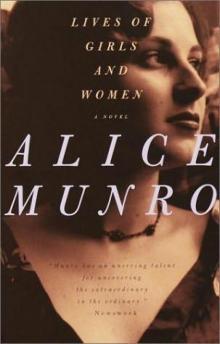 Lives of Girls and Women
Lives of Girls and Women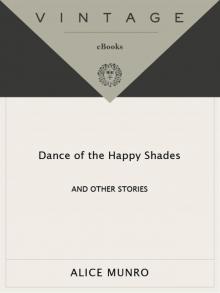 Dance of the Happy Shades
Dance of the Happy Shades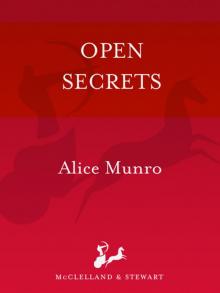 Open Secrets
Open Secrets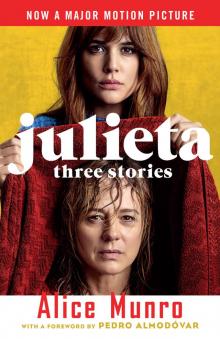 Julieta (Movie Tie-in Edition)
Julieta (Movie Tie-in Edition)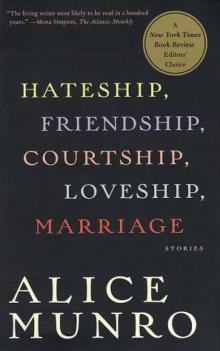 Hateship, Friendship, Courtship, Loveship, Marriage: Stories
Hateship, Friendship, Courtship, Loveship, Marriage: Stories Alice Munro's Best
Alice Munro's Best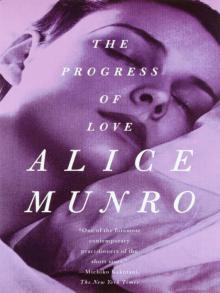 The Progress of Love
The Progress of Love Selected Stories
Selected Stories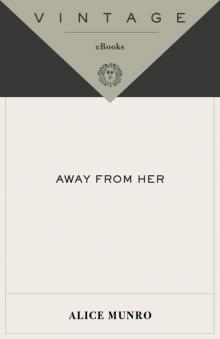 Away from Her
Away from Her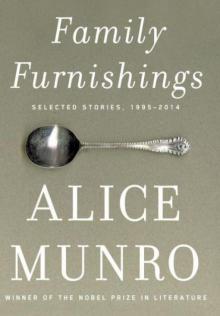 Family Furnishings
Family Furnishings Moons of Jupiter
Moons of Jupiter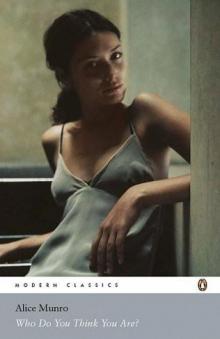 Who Do You Think You Are?
Who Do You Think You Are?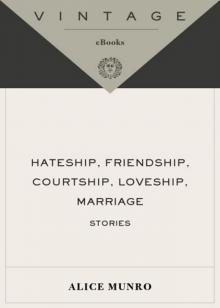 Hateship, Friendship, Courtship, Loveship, Marriage
Hateship, Friendship, Courtship, Loveship, Marriage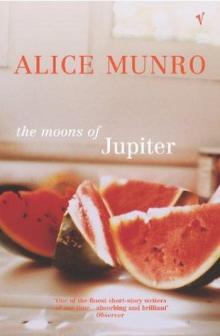 The Moons of Jupiter
The Moons of Jupiter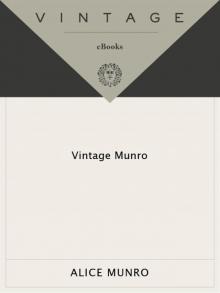 Vintage Munro
Vintage Munro The Love of a Good Woman
The Love of a Good Woman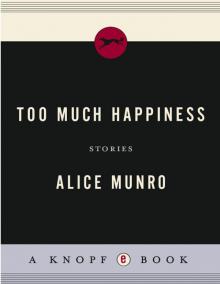 Too Much Happiness
Too Much Happiness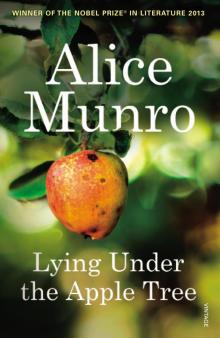 Lying Under the Apple Tree
Lying Under the Apple Tree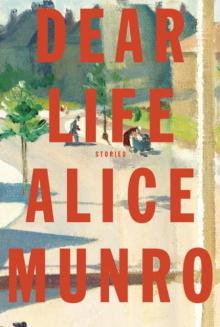 Dear Life
Dear Life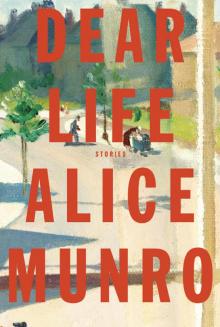 Dear Life: Stories
Dear Life: Stories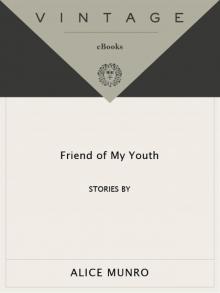 Friend of My Youth
Friend of My Youth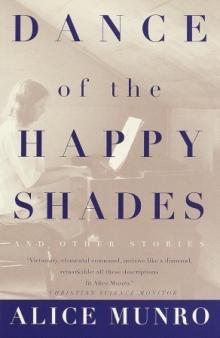 Dance of the Happy Shades: And Other Stories
Dance of the Happy Shades: And Other Stories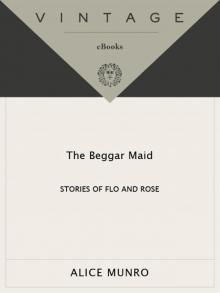 The Beggar Maid
The Beggar Maid